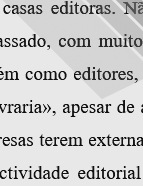

................................
Bertrand's origins date back to the 18th century, to one of the French families that dominated the book trade in Portugal. It has accompanied all the changes in the sector and has continued to operate. Its founding date is not easy to establish. The first mention of a Bertrand (possibly Martinho Bertrand) dates back to 1742, in an advert in the Gazeta de Lisboa [Lisbon Gazette], linked to Pedro Faure Legendron, who had owned a print shop since at least 1727. During the following decade, in 1754, there was an advert for the sale of the Dicionário de Francês [French Dictionary] by Father José Marques in the shop of the Bertrand brothers (Martinho and João José). However, this partnership between the two brothers disintegrated shortly afterwards, since by 1756 only João José's name appeared. At this point, the Bertrands' standing in the book business was already consolidated. João José's sons and wife would remain in the business: in 1779, the name Viúva Bertrand & Filhos [Widow Bertrand & Sons] appeared and lasted for almost a century. Their grandchildren assumed control of the company between 1815 and 1873, following the death of the last Bertrand, Francisco, and would become the publishers of Herculano, for example, with whom they maintained a good relationship. The company was later purchased from the heirs in 1876 by Councillor Augusto Saraiva de Carvalho and his partner, trade unionist José Fontana, who committed suicide in the bookshop that same year. Augusto Saraiva kept the publishing house open until its sale to José Basto, who had worked there and would boost the business considerably. The company continued to change hands: in 1910, it was sold to Júlio Monteiro Aillaud; in 1933, it became a public limited company, later purchased by a French bookseller, Marcel Didier, who sold it to Manuel Bulhosa in 1969. And it was with this owner that it reached the year 1974. (F. Guedes, O Livro e a Leitura…[The Book and Reading], 1987, pp. 15-44.)
Two unavoidable names immediately spring to mind from the Bertrand catalogue, and, for very different reasons, are also the two most important Portuguese historians of the19th century, whose books have been commercially re-edited to this day: Alexandre Herculano and J. P. Oliveira Martins. For reasons of brevity, in relation to the former the História de Portugal, the História da Origem e Estabelecimento da Inquisição em Portugal [History of the Origin and Establishment of the Inquisition in Portugal] and the Opúsculos [Opuscules] may be mentioned. As regards the latter, the "Biblioteca de Ciências Sociais" ["Social Sciences Library"] collection is particularly noteworthy, in which he published his own titles from 1879 onwards, such as the História de Portugal, História da Civilização Ibérica [History of the Iberian Civilization] and Portugal Contemporâneo [Contemporary Portugal], among others, on a variety of subjects.
